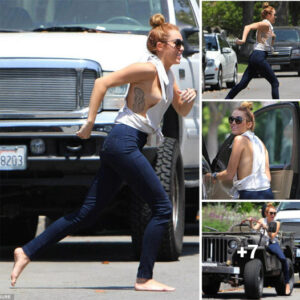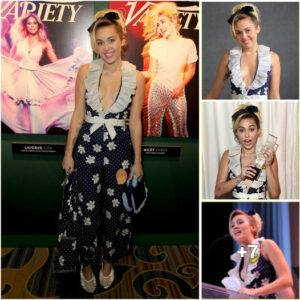Miley Cyrus Tells Lars Ulrich HowShe Found Her Inner Rock Star
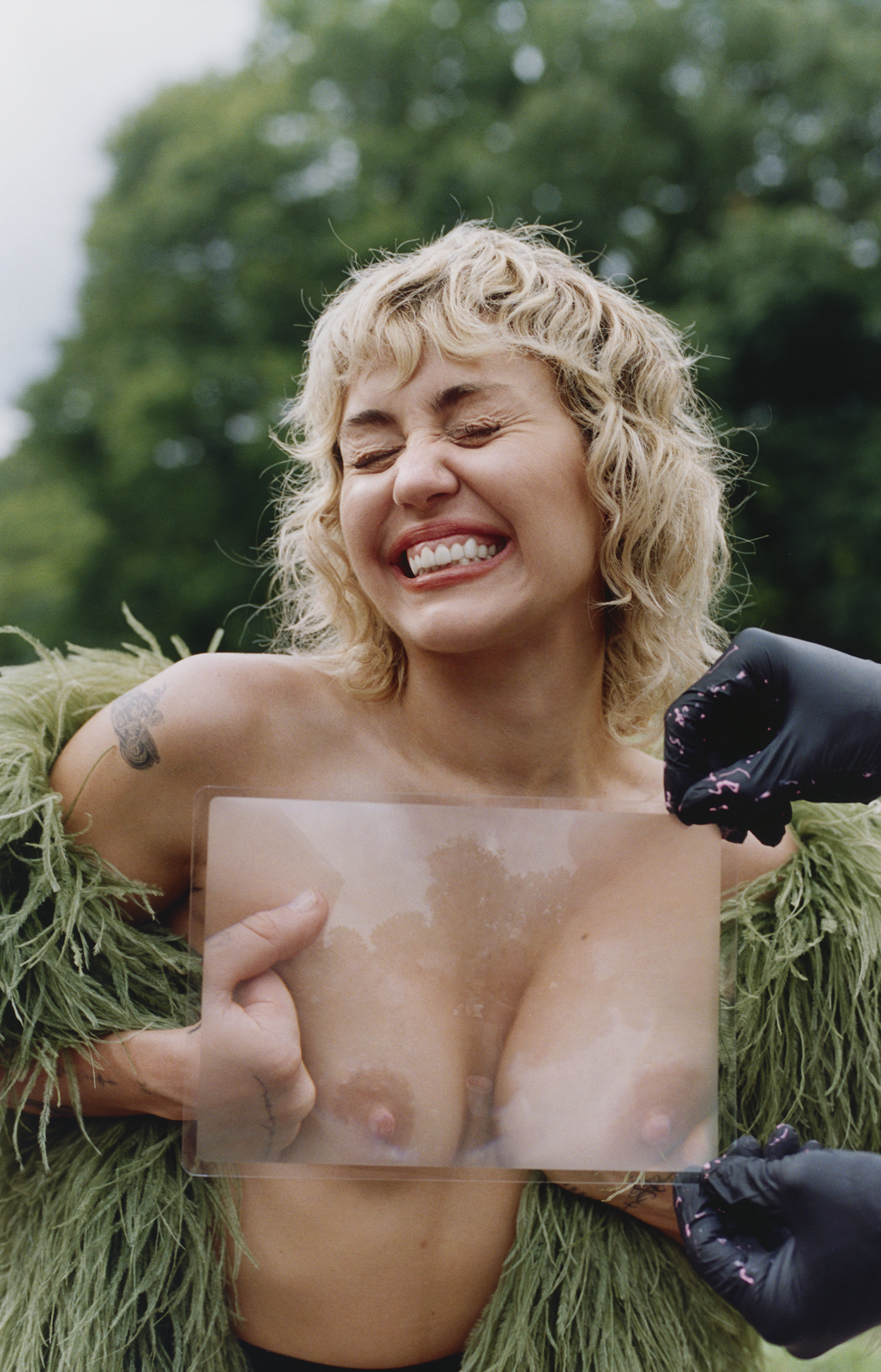
“Yeah, I really am a rock star.” Back in 2007, Hannah Montana tried to tell us who Miley Cyrus truly was. Fourteen years later, Cyrus has fulfilled her alter-ego’s prophecy. After running her natural pop instincts through hip-hop, country, and psychedelic filters, Cyrus has, at 28, reached her final form, a zero-fucks-given rocker blessed with an instrument more powerful than the heaviest guitar: her voice. And if her latest album Plastic Hearts left any doubt that her rock bona fides were for real, then her cover of Metallica’s “Nothing Else Matters,” which she performs on the tribute album The Metallica Blacklist, is further proof that at this stage of her career, Cyrus, as she tells Metallica drummer Lars Ulrich, knows exactly who she is.
———
MILEY CYRUS: Hi, my friend Lars. How are you?
LARS ULRICH: Hey, my friend Miley. You know what? I’m rocking it. I’m in San Francisco. The sun is shining. It’s a good day to be alive.
CYRUS: That’s what I like to hear. I’m feeling the exact same way. I think I’ll get to see you in person soon. We’ve done all this collaboration from a distance, and I’m excited to start getting back in a room together. I’m on a festival run right now, so I’m actually performing for human beings.
ULRICH: We’re going to see you at BottleRock in, what, two weeks?
CYRUS: I look forward to that.
ULRICH: It’s going to be quite a weekend with you, Guns N’ Roses, and the Foo Fighters. It’s 30 minutes from where we live, so we’re going to be there with bells on, ready to hang out.
CYRUS: I just played Lollapalooza. Beforehand, I was torn. I wasn’t sure if it was going to be this bicycle moment, where you pick up right where you left off like nothing ever changed, or if it was going to feel completely new, and I was going to fall back in love and remember why I do this in the first place. In the end, it was somewhere in the middle.
ULRICH: It’s such an awesome stage to walk out on. You got the whole skyline of Chicago and 100,000 people. Has it been a year and a half since you last performed
CYRUS: Yes. On these festival runs, you almost get desensitized to the energy and the impact of that many souls filling up a space.
ULRICH: You didn’t do any warm-ups or club shows to get your feet wet before Lollapalooza? You just walked right out on that stage for the first time in a year and a half?
CYRUS: Pretty much. I’m an extremist in that way.
ULRICH: That’s fucking crazy.
CYRUS: It felt like jumping out of an airplane in front of 100,000 people. It brings back that tingle of fear, or maybe anxiety, which I haven’t felt in a while. But it reminded me, again, of how all of that’s erased when you perform. There’s so much less judgment in a live music setting than exists anywhere else at the moment.
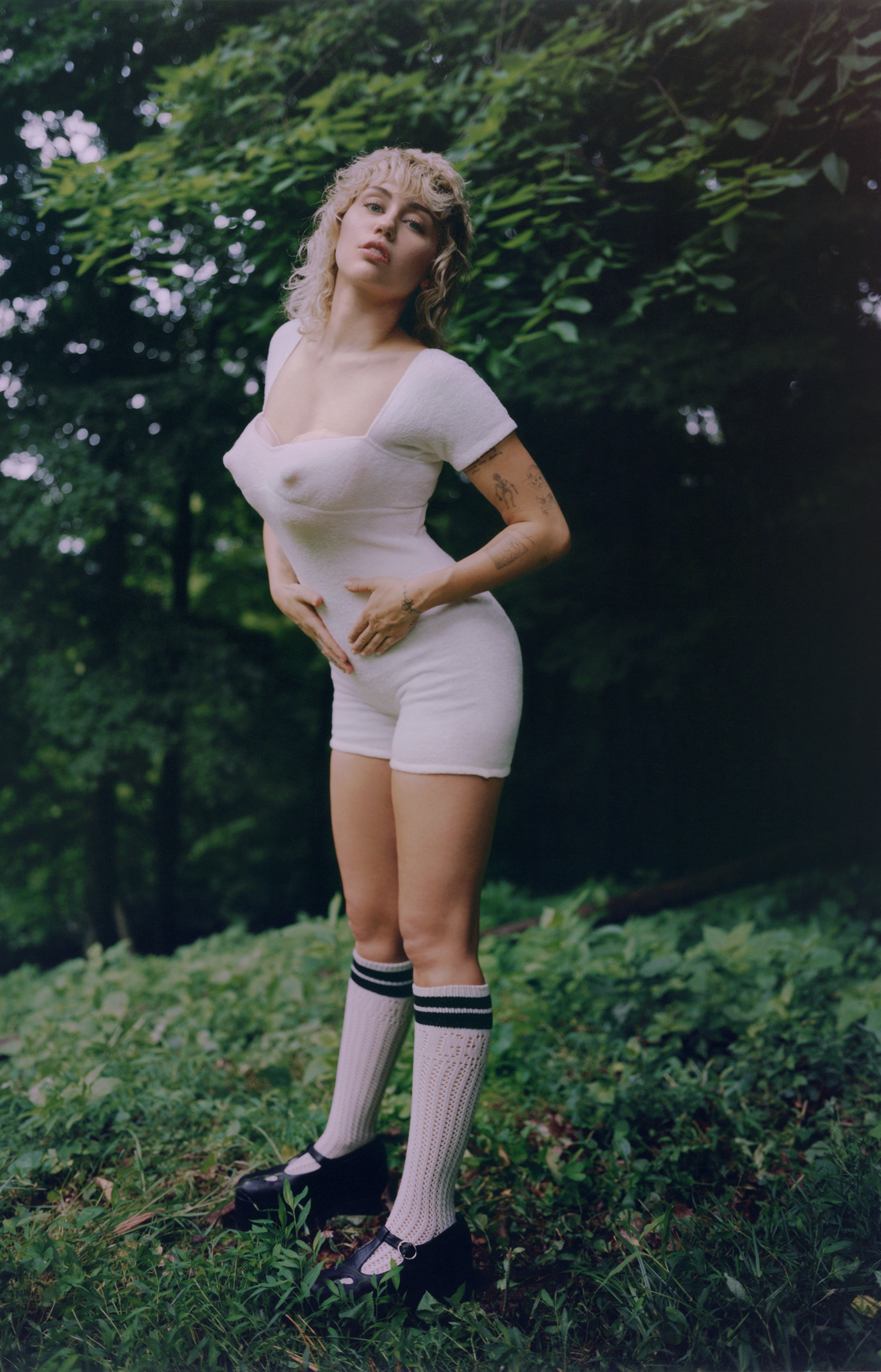
Romper by Buci. Socks and Shoes by Gucci.
ULRICH: Especially in a moment like this one. We’ve all been through the craziest 18 months of our lives. Obviously, so many people have been through worse shit than you and I have, but I’m sure you felt the energy flowing through that crowd. It must have been a beautiful moment.
CYRUS: It actually made me think of all the amazing footage and photographs of Marilyn Monroe performing for the troops. I couldn’t stop thinking of that iconic image of her, bringing people hope in the form of sexuality and wit and beauty and joy. But at the same time, she was able to offer that because she was so insulated from the experience that the soldiers were living through. She was this breath of fresh air because she didn’t have the same darkness and pain and death taking over her aura. But in this case, we’ve all been soldiers, in our own way. Of course, as you said, you and I have not had the same pandemic experience as most of the population, because our sanctuaries and our homes are truly safe.
ULRICH: Exactly, but even so, we’ve all been in the trenches. How did it feel when you walked out on that stage?
CYRUS: Weirdly, this peace came over me. After the chaos of the last year, it was almost like, “This is it? This is what I’m going to feel?”
ULRICH: It’s funny you say that, because we’re getting back into the trenches ourselves soon. And obviously, it’s a whole new world out there. We’ve been talking with our team about COVID protocols, and it seems like the safest, most peaceful place you could be these days is onstage. The phone doesn’t ring, nobody can bother you. You’re alone up there.
CYRUS: No politics, no news, no pain.
ULRICH: Exactly. You leave all the horseshit behind when you walk out on that stage. It’s the greatest feeling. Speaking of iconic festivals, you were at Glastonbury in 2019, and so were we. I missed your performance, but I know that you played “Nothing Else Matters,” I believe for the first time. What brought that song to Glastonbury?
CYRUS: I have two notebooks that I take everywhere I go. One of them is filled with my morals, my values, my purpose, my potential, my capabilities, and my commitments—to others, and to myself. I’m constantly writing things in there. Recently, I wrote down something very wise that I heard, which is related to your question. It was about how lyrics are one of the most resonant aspects of a song, and of why an audience connects with a song. It has to do with the words, and to challenge that is to say that there’s no difference between lightning and a lightning bug. But there’s a big difference. When I think about the sentiment behind “Nothing Else Matters,” it aligns completely with my morals and my values. When I listened to “Nothing Else Matters,” and I knew that I was confirmed for Glastonbury—I actually have chills talking about this—it was the only song that I could imagine playing.
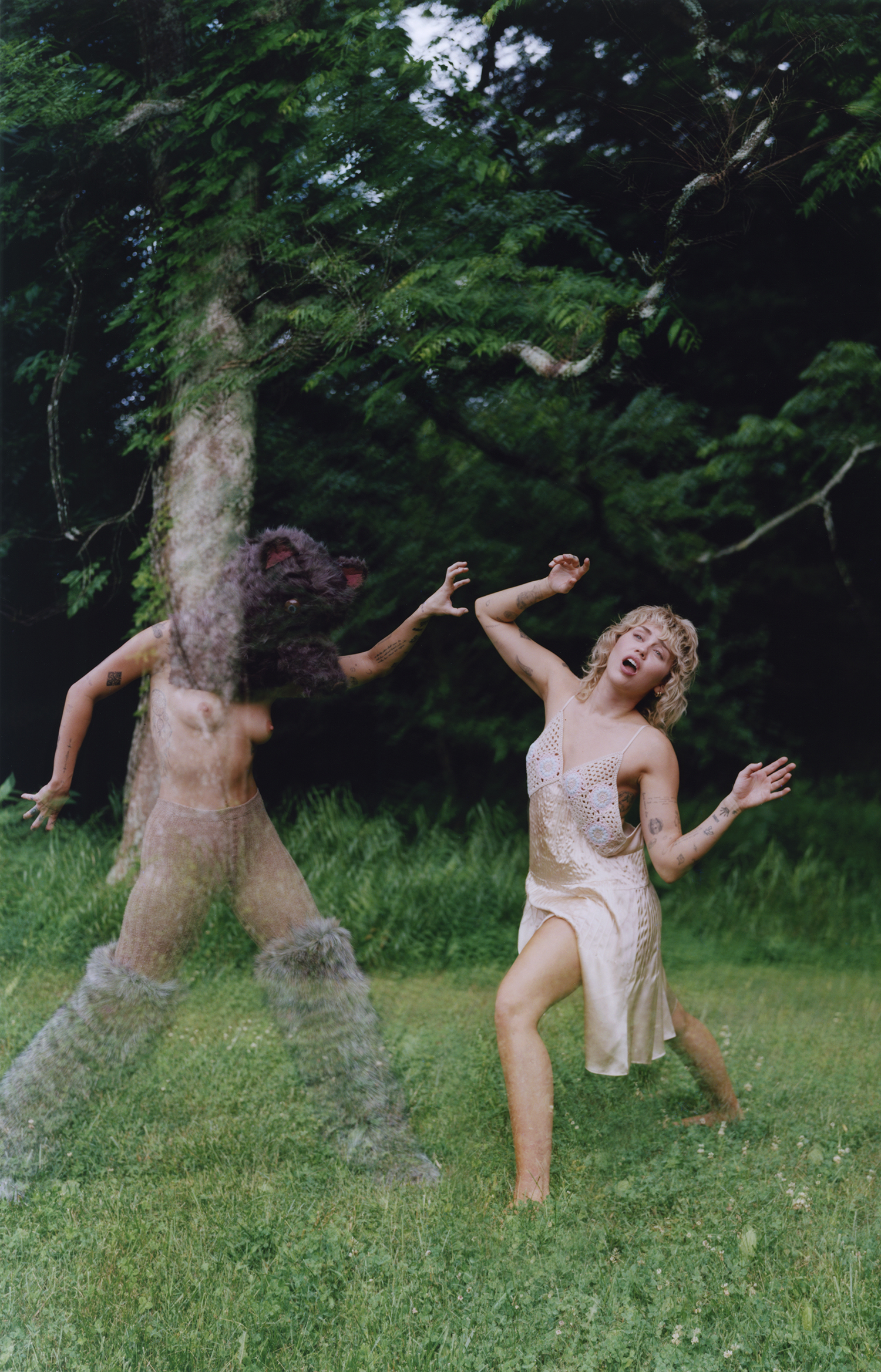
Dress, Tights, and Boots by Miu Miu. Custom Headpiece by Nicholas Des Jardins.
ULRICH: I’m getting chills hearing you say that. We went there for the first time in 2014, and you know the English press—they can be fairly precious, and they can be very protective of their institutions. And here comes this big, loud American rock band playing Glastonbury, which is an iconic thing to most Brits. But we just brought the spirit of togetherness and unity. And we ended up spending the whole weekend walking the entire festival grounds. I would never venture out and walk around at most festivals.
CYRUS: But at Glastonbury, you feel safe.
ULRICH: Right. You never get scared or overwhelmed, or wonder, “Why am I out here?” It’s this family farm, there’s no corporate energy at all. It’s this pure thing of all of England coming together for a weekend. We fell in love with it.
CYRUS: It ties into something that struck me about the Blacklist album. There’s a lack of judgment of the artists that are featured on the record. You’re bringing in Elton John, Yo-Yo Ma, me, and it feels like no one’s excluded from this party. The door is fucking open. It’s almost like we spent the last year living in these multiple dimensions where we have experienced more division, but also more unity. At the same time you’re seeing the divide, you’re seeing the glue. We’re bringing people together, and we’re stronger together. Aloneness is special, but togetherness is powerful.
ULRICH: There’s nothing better than knowing that other people are going through the same experience, at some level. The most basic human desire is not to feel alone.

Top and Boots by Chanel. Bodysuit by Baserange.
CYRUS: This eclectic mosaic of a collaboration that we’ve brought to life is reflective of that. It’s like, “Fuck the divide.” For you to listen to my cover of “Nothing Else Matters” with an open mind is an example of that—you don’t judge who I’ve been, what I’ve done, or how people see me. Then, by allowing me to cover “Nothing Else Matters” on the record is like you guys validating my relationship to this song. It feels like it was written for me, and it was something that I was able to make my own. And now, my fans have that connection to it as well. That’s what happened when I covered “Jolene,” too. That’s another perfect song.
ULRICH: Right.
CYRUS: What I love about that process is that it makes my fans go, “Oh shit, Metallica?” You’ve opened this door for them.
ULRICH: I can relate to everything you’re saying, because we began as a cover band. When we first started playing in L.A. back in the early ’80s, we did nothing but obscure covers. We didn’t play Van Halen and Journey and Kiss songs, we played a bunch of cool, underground, British metal songs. Out of that setlist came our own sound. We didn’t have the patience to curate our vibe, we just wanted to get out there and play. Playing other people’s material, and reinterpreting it—with respect, obviously, to the original vision—is so freeing. You don’t have to be so precious about where to put the double chorus, or whether to go to the bridge before or after the solo. All these things that you drive yourself nuts over in your own songs just melt away.
CYRUS: Absolutely.
ULRICH: It’s amazing to look at this list of 53 artists who have come together and taken the time to record all these songs. There are all these versions of “Nothing Else Matters” by different artists. To hear the song filtered through everybody’s voices, approaches, and visions is an incredible thing. We know we’ve been around for a while. We can certainly feel it in our bodies, but at the same time, our spirit is young. And our spirit is always about the next album.
CYRUS: Yeah.
ULRICH: So when the press and fans are gracious and respectful enough to say, “Oh, this is classic Metallica,” or, “We’re celebrating the 30th anniversary of this album,” we sit there like, “Holy fuck. We still think all our best years are ahead of us.” When people ask me, “What’s your favorite Metallica album?” I say, “The next one.”
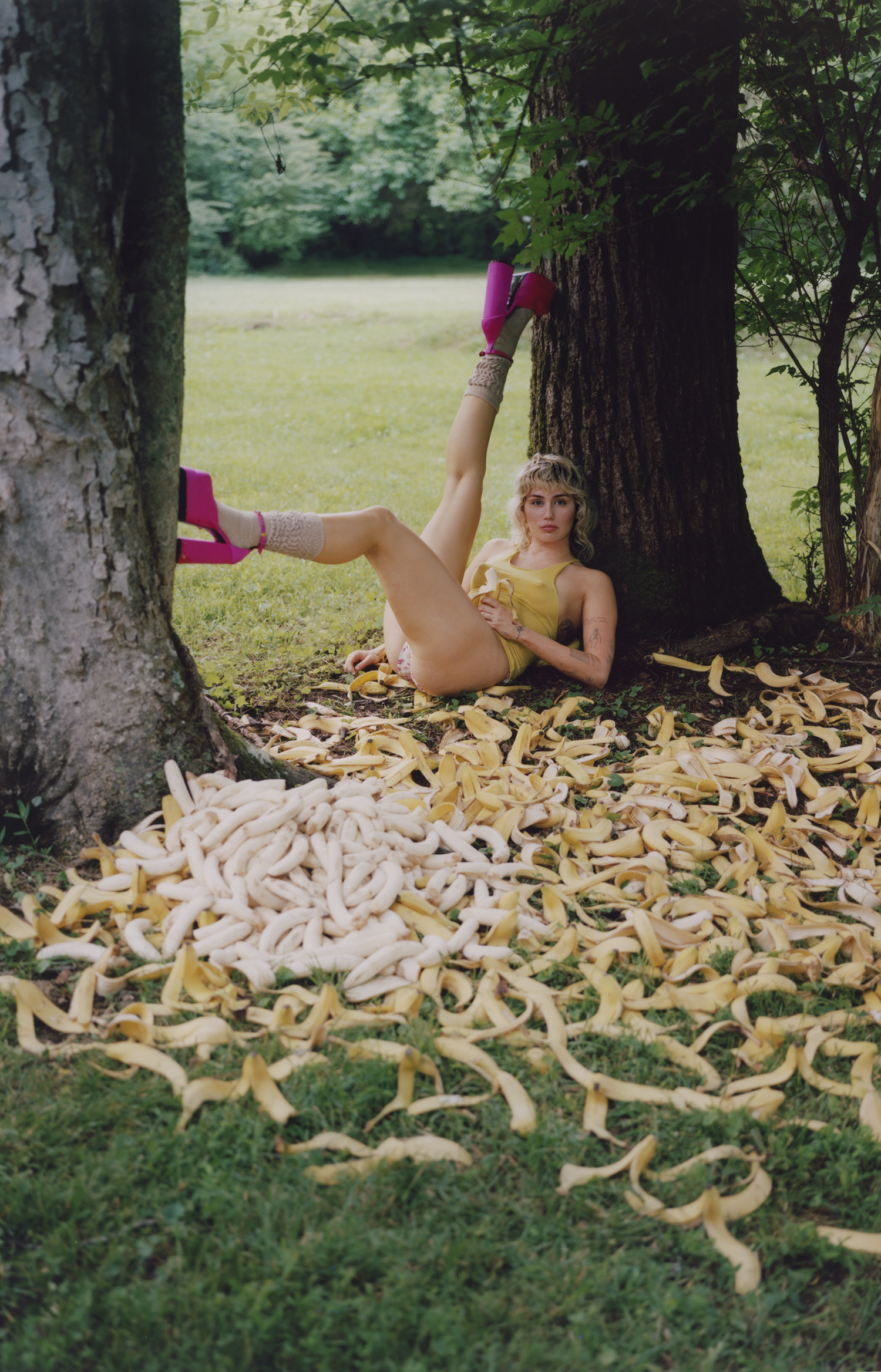
Bodysuit by Judy Turner. Bikini Bottom by Mirror Palais. Socks by Brother Vellies. Shoes by Versace.
CYRUS: Agreed.
ULRICH: That’s the spirit that keeps us young and hungry. It’s why I’m so appreciative of what you’ve done, of the whole team that came together on this project. I mean, hearing Elton play the intro—
CYRUS: It’s the fucking coolest thing.
ULRICH: And then Yo-Yo Ma.
CYRUS: I felt chills.
ULRICH: Every time I hear it, I get goosebumps. As you know, Andrew [Watt, Metallica’s mixing engineer], has a lot of youthful energy. He would text me every three days and go, “You don’t understand what’s coming together here. This thing is crazy. Elton just did this. Miley’s taking the vocals to a whole new place.” I’d read those texts with the biggest smile on my face. Usually we record a song before we play it live, but you covered this live before you came into the studio to record it. Was there something different that came out of it because it had already been in your live repertoire?
CYRUS: More than that, it was embedded in my soul. That’s the way I related to this song. I didn’t go in to cut just any vocal. This song means something to me on the deepest level. What’s funny about that recording process was that I cut the vocal in a place that was the polar opposite of where I was the first time I sang it. I recorded it at home, in the middle of a fucking global pandemic, because I couldn’t leave my house.
ULRICH: Where?
CYRUS: I was in my studio, and it was a completely different experience performing it in that solitary way. It was no less poignant than playing it at Glastonbury—if anything, it was more powerful. The lyrics truly fucking resonated. There was nothing that I couldn’t try, because I wasn’t in front of 250,000 people. I was in this safe place. We’ve talkedaout how lucky we are to have that. I stuck, on some level, to the melody. I even went down to some of those octaves, because singing those super-low lead vocals is so satisfying. My whole life, whether in vocal training or just continuing to hone my craft, it’s always been about, “Why do you sound like a man? Where’s your fucking falsetto, bitch? Why can’t you sing the high octave of ‘Party in the U.S.A.’ anymore?” In this song, I get to sing in that low register, and I get to live in that authentic, genuine sound. My voice is how I represent myself. It’s how I express myself. I’ve worked with so many people who tell me, “We’re going to have to bring in a singer to hit those high parts.” You know, “falsetto” is this Latin term for when a boy goes through puberty, but they still want him to sing in the choir. It means “false.”
ULRICH: Right.
CYRUS: I don’t have a false voice. You know me personally, we’ve hung at parties. I am who I am. I say what I mean in the moment, even if that changes tomorrow. I was honored by the fact that I didn’t have to sing this song in the way that females are “supposed” to sing. You can hear that at the end of the song, when I take the gloves off and just start flying. That part of the song really grabs people. It’s that lower register of my voice. So I’m grateful to have a song where I can lean into that.
ULRICH: Well, it’s fucking insane. I can’t wait to experience it again one day. The last time I saw you, you were performing at the Chris Cornell tribute in L.A. like, two years ago?

Briefs and Socks by Gucci.
CYRUS: Yeah.
ULRICH: You obviously fucking killed it that night with “Say Hello 2 Heaven.”
CYRUS: You killed it, too. I left right after I got to see you, because you guys are who I was waiting for. That night had the same spirit that you described at Glastonbury. I had a connection with Chris’s daughters. They came to the Hannah Montana set a long time ago, and they introduced him to me and my music. That was a special moment in their relationship with their father. I was there because they knew it would make his daughters happy if I did this tribute to their father. And again, to be allowed to be a part of that beautiful memorial, and playing his music without being judged, that was really special to me. I just played “Say Hello 2 Heaven” at Lollapalooza. I have a fucking killer band. Chris Chaney from Jane’s Addiction is in it.
ULRICH: I guess we were all leaving at the same time, because when we were waiting at the Bristol airport, your whole band was there. I remember Chris and the rest of the gang. I know you have this crazy tight group that has played with you for a long time.
CYRUS: That’s right.
ULRICH: It’s so cool that you have that family to depend on. It’s not just some faceless guys.
CYRUS: They are my family when I’m on the road. They’ve been through everything with me. Dude, this is going to freak you out—my band has been my band since I was 12 years old.
ULRICH: That’s crazy.
CYRUS: I’m about to turn 29. We’ve been through so much. When we’re out on the road, we talk about loneliness. It really can get that way. I have such a support system in them. I love having these authentic, real rock dudes in my band. We even revisit songs that I wrote before I was able to make this huge sonic pivot in my career, before I discovered rock and roll. Now, we cover my own songs. We take my original songs, and turn them on their head, and make them kick ass.
ULRICH: It’s the best thing.
CYRUS: I can’t thank you enough for having me on the record, having me on “Nothing Else Matters,” and doing this phone call today. I appreciate it so much.
ULRICH: Of course. See you at BottleRock.
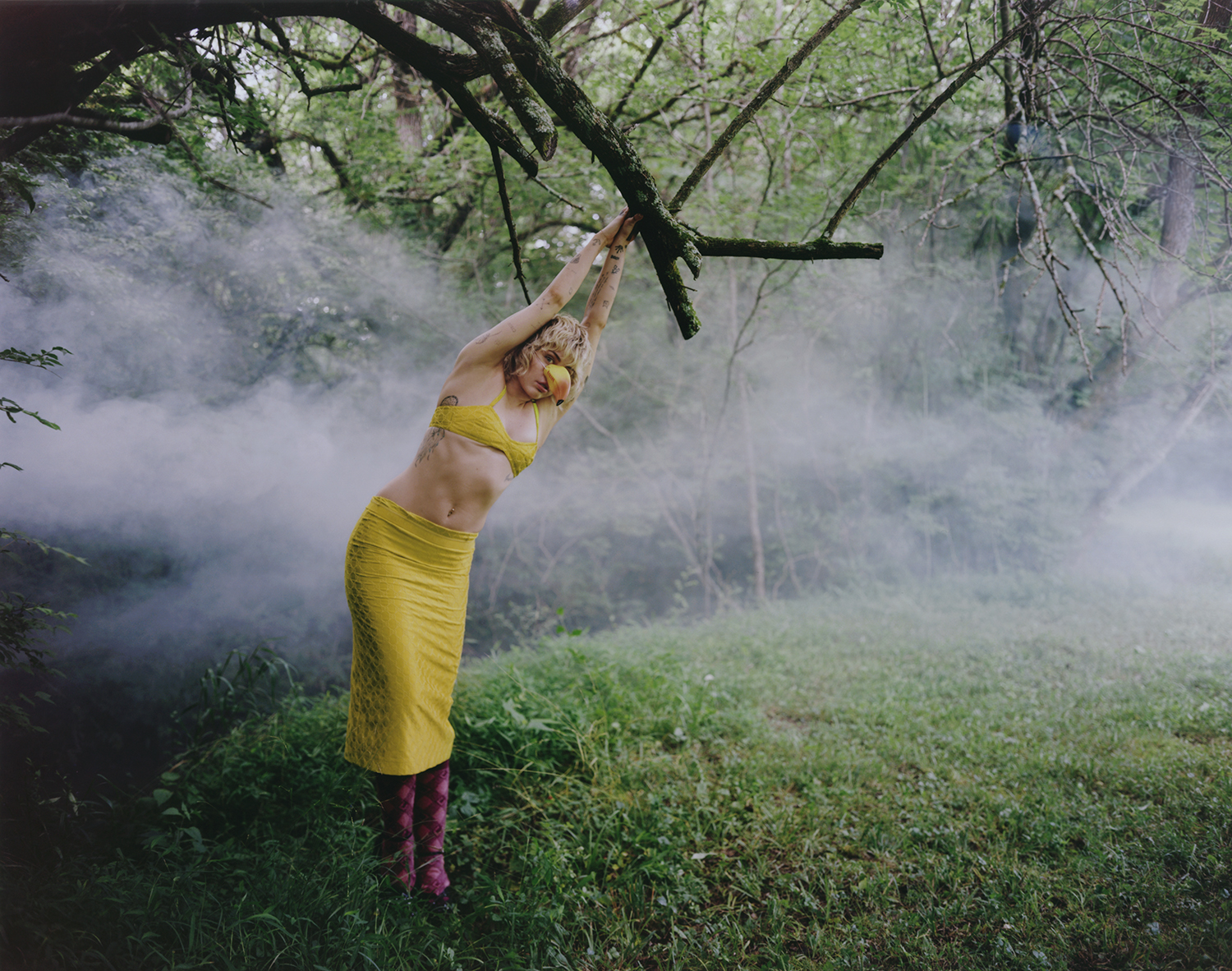
Bra, Skirt, and Shoes by Gucci.
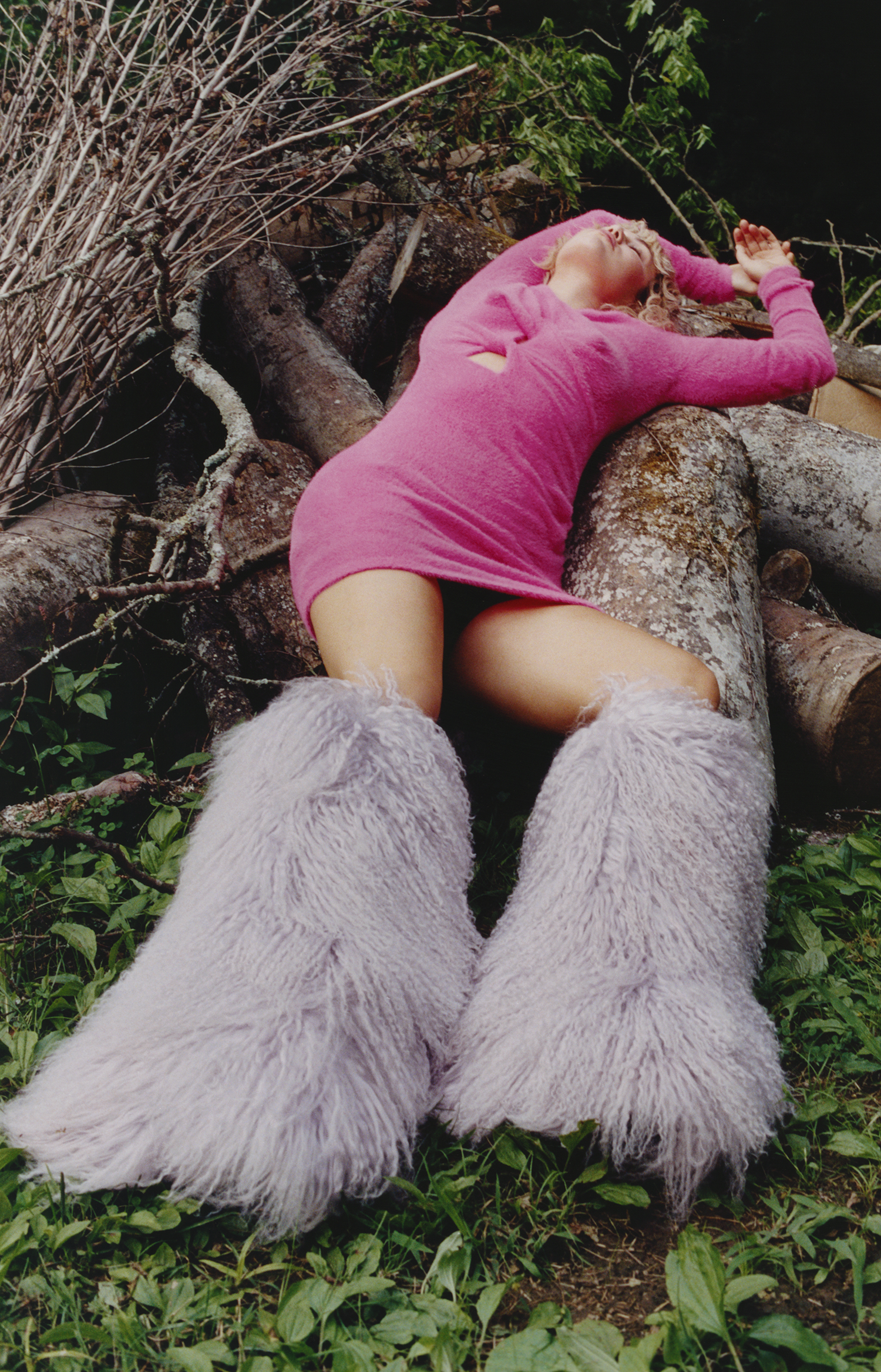
Dress by Kenzo. Shorts (worn underneath) by Melitta Baumeister. Leg Warmers by Angel Chen.

Top and Shorts by Saint Laurent by Anthony Vaccarello. Socks by Brother Vellies. Shoes by Christian Louboutin.
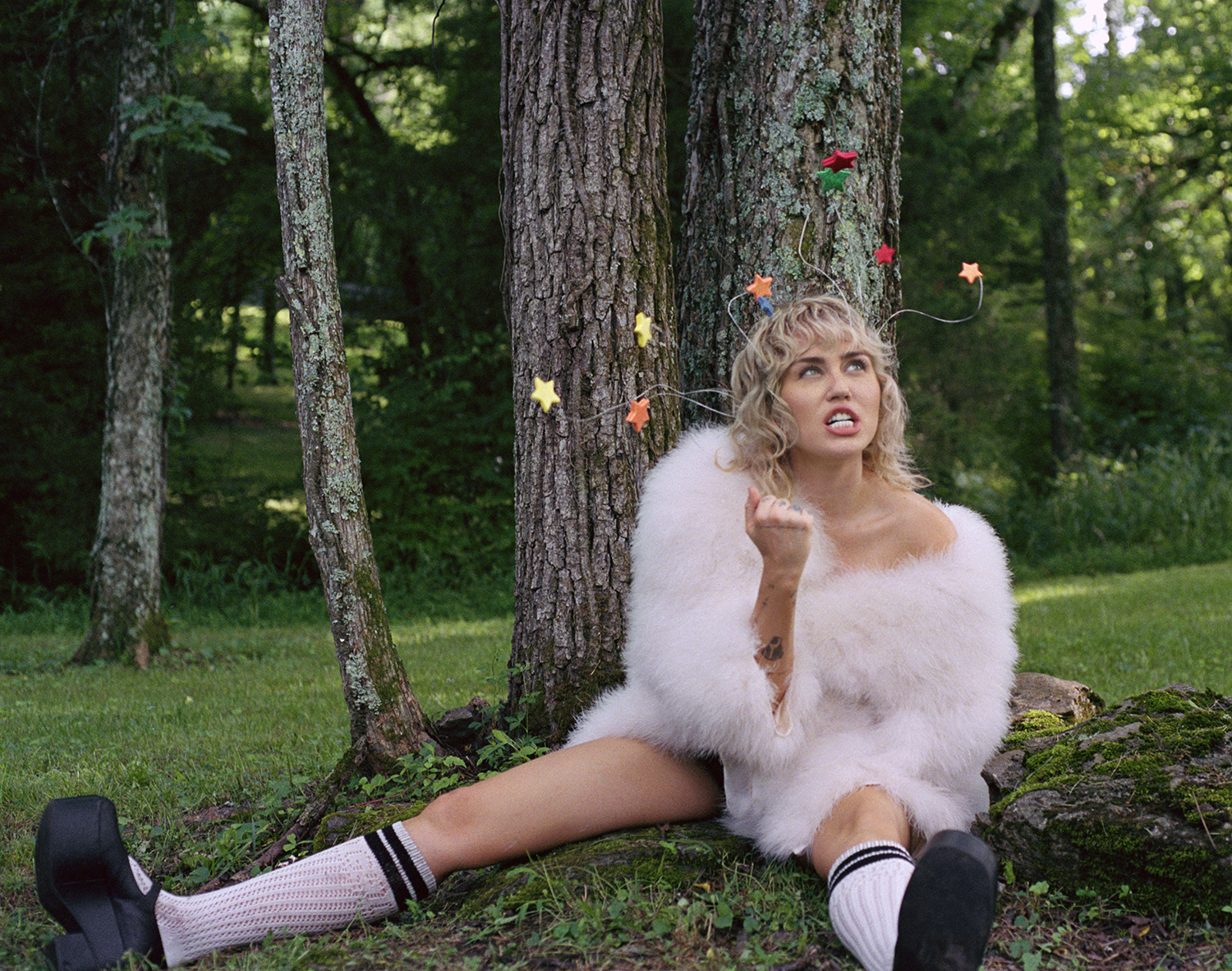
Coat, Socks, and Shoes by Gucci.
—
